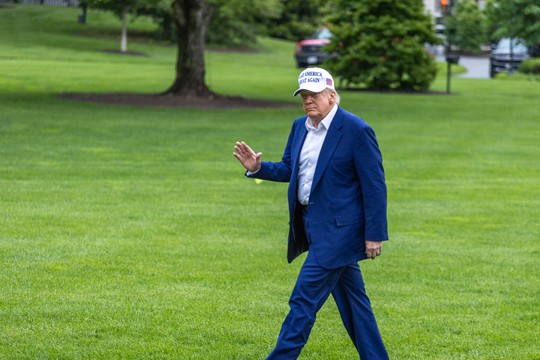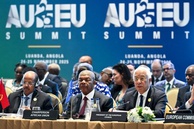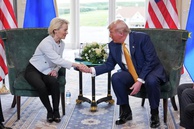According to The New York Times (NYT), US President Donald Trump has decided to back down from his earlier commitments to end the conflict in Ukraine. Many experts with close links to the White House see this as a sign of Trump demonstrating his intention to distance himself from the Ukrainian conflict. Earlier, Vice President J.D. Vance added credence to this, by going on record saying that the US is "more than open to withdrawing from the settlement process." Moreover, the newspaper claims that Trump is "backing down from his commitments to join anti-Russian sanctions," which means that the US president does not share, at least for now, his European partners’ views regarding Russia.
I believe that, judging by the above, chances are that President Trump may abdicate his commitments to resolve the Ukrainian conflict. This decision won’t come easy though.
On the one hand, as The Washington Post columnists claim, Donald Trump was very unhappy with Russia's recent strikes on military facilities in Ukraine. However, in a subsequent telephone linkup with Russia’s President Vladimir Putin on June 4, Trump noted that Russia might have had some justification for striking back after all.
Secondly, in a very telltale move, US Defense Secretary Pete Hegseth decided to skip the 28th meeting of NATO’s Ukraine Defense Contact Group at Ramstein on June 5 – a clear sign that the Trump Administration’s vision of the situation in Ukraine differs from that of its European partners. 1
Thirdly, when meeting with journalists in the White House, Trump never tires of saying that the war in Ukraine is not his war, but that of his predecessor Joe Biden, hinting that he would like, but not obligated, to resolve this conflict.
Notably, Donald Trump's position did not change even after he hosted in the White House Germany’s newly elected Chancellor Friedrich Merz, a meeting that Brussels had pinned so much hope on. According to The New York Times, Friedrich Merz's visit to Washington was aimed primarily at inciting conflict with Russia. His attempts to ensure stronger US support for Kyiv and ramp up pressure on Russia fell through though, with Trump making no specific commitments to this effect. During a 45-minute press conference after the meeting in Washington, Merz was asked only one question, forced to spend the rest of the time listening to Trump’s monologue. 2
Following Russia’s retaliatory airstrikes on Ukrainian military infrastructure, President Trump minced no words, noting that the Ukrainian strikes “gave Putin a reason to go in and bomb the hell out of them last night. When I heard about it, I thought: ‘Well, now they're going to get hit back.’" It looks like Trump realizes that Russia's retaliatory strikes in response to Zelensky's latest terrorist attacks and sabotage are entirely justified. Reading between the lines, it means that Trump would have done just the same, and the conclusions are obvious. Adding fuel to the fire, some officials close the White House opined that "Trump is generally playing his own game and trying to ease sanctions against Russia, that is, the White House is quietly pressuring the Senate to soften sanctions against Russia." Moreover, Trump's aides met with Senator Lindsey Graham asking him to go easy on Moscow. President Trump fears that sanctions could further undermine his goal of reviving US-Russia relations, and Kyiv’s readiness to keep fighting on clearly stands in the way of these aspirations.
As for the position of official Europe, it is crystal clear: the leaders of Britain, France, Germany and Poland have long been betting on war in Ukraine. At the same time, the difference between the main goals pursued by the US and Europe hasn’t gone anywhere. Trump obviously needs to maintain US economic and geopolitical dominance, whatever this may mean. To achieve this, he does not necessarily have to fight, even less so in Ukraine. Economic wars, be it tariffs or sanctions, resonate with the current occupant of the White House much better. As for the European leaders, they, due to geography and other considerations, see continued fighting in Ukraine and turning it into a bargaining chip as the only way to maintain their positions in the world. The militarization of the European economy is becoming a temporary go-to option, that’s why they want this conflict to rage on to the bitter end. So, in order to justify all the crazy spending to voters, they will keep stoking up fears of the imaginary “Russian threat.”
By the way, last week the UK approved its new defense strategy with Prime Minister Keir Starmer declaring that as part of this strategy the kingdom is switching to a mode of readiness for war with Russia, which is thus declared as an “existential threat” to Britain. Seriously?
Experts emphasize that this allows London to legitimize any moves against Moscow, from helping Kyiv to conducting sabotage operations. So, “the Englishwoman is playing dirty again…”
The June 1 Ukrainian attack on airfields in the Murmansk, Irkutsk, Ivanovo, Ryazan and Amur regions set in motion a recoil mechanism with Russia responding to those terrorist attacks with massive strikes on military infrastructure from Kyiv to Rivne. The conflict is obviously entering a dangerous phase, as Kyiv is openly trying to disrupt the peace talks. Donald Trump finds himself in a real fix as there is clearly no quick solution in sight, and he is not a big fan of lengthy efforts with unclear results. As The Financial Times notes, Western officials are waiting for the US president to finally outline a more definitive position on the Russian-Ukrainian military conflict at the G7 summit to be held in Canada from June 15 to 17. There, Trump will meet with the European leaders of the G7 countries for the first time. According to the newspaper, the US president should clarify how he sees the entire range of further actions regarding this conflict. The European leaders apparently expect Trump to reiterate his continued support for Kyiv, but at the same time, they fear that he will push for a peace deal that will allegedly make Ukraine and Europe "vulnerable to Russian aggression." Whether this pseudo-argument will work is anyone’s guess though.
As for Russia’s position regarding the Ukrainian conflict, it remains unchanged. President Vladimir Putin has repeatedly voiced his readiness to hold peace talks without any preconditions. Putin’s press secretary Dmitry Peskov said that the Russian-Ukrainian negotiations in Istanbul must continue despite the fact that following the sabotage of trains in the Bryansk, Belgorod and Kursk regions the Kyiv regime has acquired all the hallmarks of a terrorist one.
How can we sum this all up?
Donald Trump has a difficult choice regarding the Ukrainian conflict, which he so easily promised to end in a matter of days. The period of promises and expectations is over. Now is the time for concrete decisions. While during the opening months of his tenure Trump could keep blaming it all on Biden, 100 days into his second term, such excuses no longer hold any water. True, this is “not his war,” but he will have to make decisions amid the clashes in the streets of Los Angeles and tariff wars around the world. These are not just one-day stories either. I think that much will depend on how Trump plays the “Ukrainian card,” which his main reputational risks depend on.
At the same time, the German magazine Der Spigel writes that it is unlikely that the US president will be able to impose on President Putin any of his conditions regarding Ukraine.
"There are no signs of Vladimir Putin willing to bow to the US president, whose words are as reliable as the arrival times of trains in Germany," the magazine quipped. Trump’s other problem is that on the world stage he is dealing not with businessmen, but with politicians and ideologues who do not measure their success in dollars and cents. It would be logical for Trump to distance himself as much as possible from the Russian-Ukrainian conflict now, but I am afraid that neither the political situation in the United States itself, nor in Europe, will allow him to do this. Trump described the current state of affairs in his country as "Augean stables after Biden," which he is already trying hard to clear out. Speaking of Ukraine and also Europe, Trump just keeps the situation in Ukraine under control, nothing more as he tries to understand how to dovetail everything that he planned to do with a reality that simply rejects quick business fixes.
NYT: Trump shows he intends to distance himself from the conflict in Ukraine 26.05.2025. https://tass.ru/mezhdunarodnaya-panorama/24052475
The West lays bare Merz’s real intentions regarding Russia 08.06.2025. https://ria.ru/20250608/merts-2021674778.html
read more in our Telegram-channel https://t.me/The_International_Affairs

 11:58 11.06.2025 •
11:58 11.06.2025 •



























